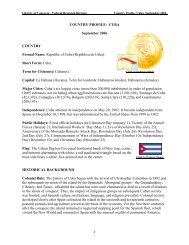1 - American Memory
1 - American Memory
1 - American Memory
Create successful ePaper yourself
Turn your PDF publications into a flip-book with our unique Google optimized e-Paper software.
179<br />
There are different issues involved: different union leaderships; different rela-<br />
tions between the leadership and the rank and file members; different manage-<br />
ment attitudes; different styles of negotiating; different histories of conflict<br />
between the parties; different levels of maturity in the union-management<br />
relationship; different attitudes toward the public welfare; different suscepti-<br />
bilities to public pressure; etc., etc., etc., etc.<br />
If this approach were to be adopted with the provision that any approach the<br />
President tools could be vetoed by either house of the Congress, the fear that this<br />
would give too much discretion to the Chief Executive would be overcome. As a<br />
matter of fact, it has been pointed out that there is no escaping executive dis-<br />
cretion in triggering any strike control so far devised. The Congress in writing<br />
the Taft-Hartley Act tried to be every explicit in detining the emergency disputes<br />
where it would be applicable, yet no one has ever prevented the President from<br />
Invoking it when he wanted to nor forced him to invoke it when he didn't want<br />
to. Furthermore, on the subject of the alleged possible "abuse of discretion,"<br />
former Secretary of Labor W. WiUard Wirtz has said : ''AVhen, under the present<br />
law. a strike is stopped by an injmiction, the exercise of governmental ijower is<br />
no less real for its having been authorized by a statute passed years earlier by<br />
Congres.s. If that injunction is either unfair or ineffective as applied to the<br />
particular case, the evil of the exercise of centralized power is no less than If it<br />
resulted from either the inadevertent or malicious error of an executive or<br />
judicial oflBcer armed with discretionary authority to apply the injunction. There<br />
is as much power exercised in the one case as in the other, and the automaticity<br />
regulating the form of its exercise in the one instance is as great a potential<br />
source of injustice as Is the possible abuse of discretion in the other. It has not<br />
been shown, and is probably not true, that the exercise of executive discretion in<br />
these situations would result in greater unfairness than does automatic applica-<br />
tion of a single legislative prescription. It does not appeal to reason to argue<br />
that recourse in all hou.sehold emergencies to a particular bottle of {patent medl-<br />
cine avoids the possibility of human error which arises If the doctor is called<br />
In."'<br />
In the last session of the Congress there were two major bills in the Senate<br />
which—between the two of them—included almost every proposal that has been<br />
put forward to cope with emergency labor disputes.<br />
These include the following:<br />
1. Covering regional emergencies.<br />
2. Partial operation—providing that the struck company will provide partial<br />
service.<br />
3. Selective operation—providing that some companies in the struck industry<br />
would continue to operate.<br />
4. An additional "cooling-off" period beyond the 80 days provided for by Taft-<br />
Hartley.<br />
5. Authorizing boards of Inquiry to make recommendations for settlement<br />
rather than merely report a finding of facts.<br />
6. After a certain period of forced operation under an Injunction, authorizing<br />
the President, subject to congressional veto, to:<br />
a. Order extension of the status quo.<br />
b. Seize the struck operation and operate it.<br />
c. Order compulsory arbitration.<br />
d. Order mediation "to finality"—I.e., lock up the parties until they come to an<br />
agreement.<br />
7. Final offer selection—I.e., requiring the parties to the dispute to submit<br />
their final offers to a panel which would select one of the final offers In its en-<br />
tirety (without modification).<br />
If the President had available to him all the above options which he could use<br />
as he saw fit depending upon the circumstances of the case (subject only to veto<br />
by one of the Houses of the Congress), he would truly have an arsenal of weapons<br />
for forcing a settlement of any dispute that was seriously detrimental to the<br />
country or to some portion of the country. He would not. as he has had to do in<br />
80 many cases, have to go to Congre.ss to seek special legislation aimed at .settling<br />
a particular strike—a procedure that Is almost universally condemned. As Dr.<br />
»W. WIrtz. "The 'Cholce-of-Procediires' Approach to National Emergency Disputes," In<br />
I. Bernstein. H. Enatson. and R. Fleming (etls.), Emergenc;/ DUputta and National Potici/,<br />
Harper. New York, 1955, p. 15S.



![Albert Einstein Papers [finding aid]. Library of Congress. [PDF ...](https://img.yumpu.com/21604228/1/190x245/albert-einstein-papers-finding-aid-library-of-congress-pdf-.jpg?quality=85)





![American Colony in Jerusalem Collection [finding aid]. Library of ...](https://img.yumpu.com/17941275/1/190x245/american-colony-in-jerusalem-collection-finding-aid-library-of-.jpg?quality=85)



![Piccard Family Papers [finding aid]. - American Memory - Library of ...](https://img.yumpu.com/17941234/1/190x245/piccard-family-papers-finding-aid-american-memory-library-of-.jpg?quality=85)


